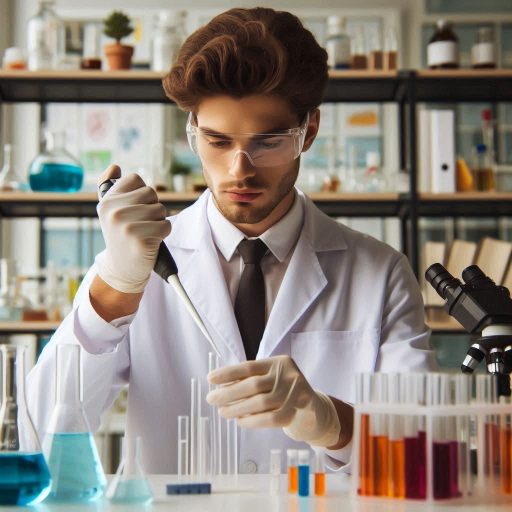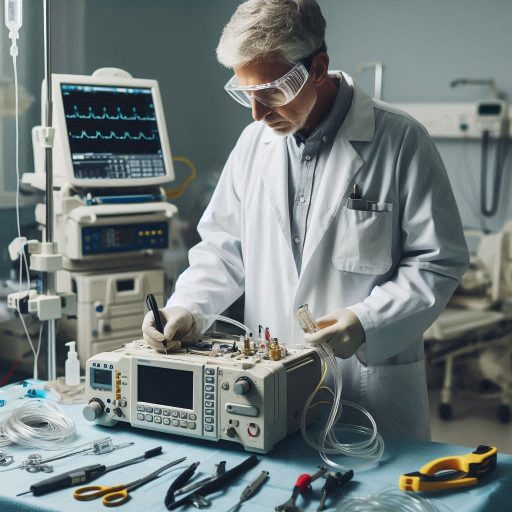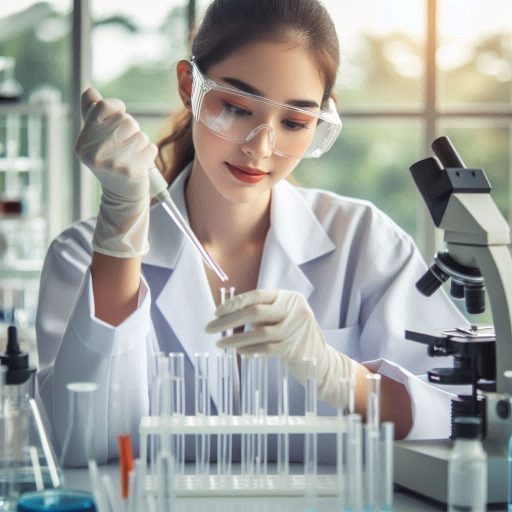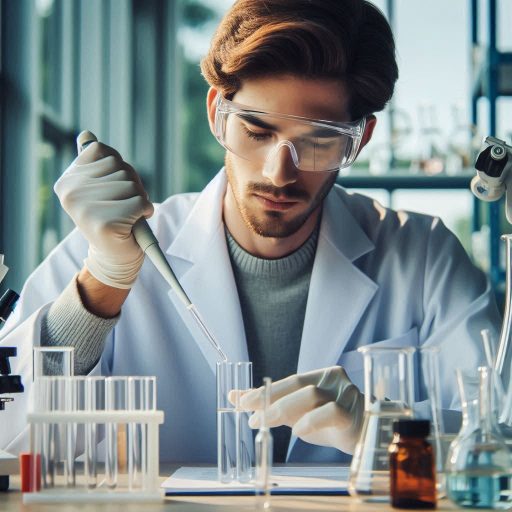Introduction
Laboratory technicians play a crucial role in scientific and medical fields.
As the demand for healthcare services and research increases, the need for skilled laboratory technicians continues to grow.
This section explores the job outlook for laboratory technicians, emphasizing their importance in various industries.
The Role of Laboratory Technicians
Laboratory technicians perform essential tasks that support scientific research and medical diagnosis.
They collect samples, conduct tests, and analyze data to provide accurate results.
Their work ensures that doctors, scientists, and researchers have the information needed to make informed decisions.
Technicians often specialize in areas such as medical, environmental, or industrial laboratories, each requiring specific skills and knowledge.
The Importance of Laboratory Technicians in Various Industries
Laboratory technicians are vital in many industries, from healthcare to environmental science.
For healthcare, they help diagnose diseases, monitor patient health, and ensure that treatments are effective.
In environmental science, they analyze samples to detect pollution, contributing to public health and safety.
In industrial settings, laboratory technicians test products and materials to maintain quality and compliance with regulations.
Their work supports innovation, safety, and efficiency across these sectors.
Overview of the Job Outlook for Laboratory Technicians
The job outlook for laboratory technicians is promising, driven by growth in healthcare and scientific research.
According to the U.S. Bureau of Labor Statistics, employment of medical and clinical laboratory technicians is expected to grow 11% from 2022 to 2032, much faster than the average for all occupations.
This demand is fueled by an aging population requiring more diagnostic tests and advancements in technology that increase the need for skilled technicians.
Additionally, as industries like biotechnology and environmental science expand, opportunities for laboratory technicians will continue to rise.
With ongoing developments in these fields, laboratory technicians can expect stable and rewarding careers.
In review, laboratory technicians are indispensable in various industries, providing critical support to healthcare, environmental, and industrial sectors.
The job outlook for these professionals is strong, with opportunities expanding in response to technological advancements and increased demand for their expertise.
Educational requirements
Typical educational path to becoming a laboratory technician
The educational requirements to become a laboratory technician typically include earning an associate degree in medical laboratory technology or a related field.
Some employers may also require a bachelor’s degree in medical laboratory science.
Students in these programs will take courses in anatomy, physiology, microbiology, chemistry, and laboratory procedures.
They will also complete hands-on training in a clinical setting to gain practical experience in performing tests and procedures.
After completing their education, aspiring laboratory technicians may need to pass a certification exam to become certified by organizations such as the American Society for Clinical Pathology (ASCP) or the American Medical Technologists (AMT).
Certification and licensing requirements for laboratory technicians
While certification is not always required to work as a laboratory technician, many employers prefer to hire certified candidates.
Certification demonstrates that a laboratory technician has met national standards for competency and professionalism.
Some states may also require laboratory technicians to be licensed, depending on their specific job duties and responsibilities.
Licensing requirements vary by state and may involve completing additional training or passing a state-specific exam.
Laboratory technicians can obtain certifications in various specialized areas, such as clinical chemistry, hematology, or microbiology.
These certifications can help laboratory technicians advance their careers and demonstrate their expertise in a particular area of the field.
Importance of continuing education for career advancement
Continuing education is essential for laboratory technicians to stay current with advances in technology, regulations, and best practices in the field.
Many employers require laboratory technicians to participate in continuing education programs to maintain their certification.
By continuing their education, laboratory technicians can expand their knowledge and skills, making them more competitive in the job market.
Continuing education can also open up opportunities for career advancement, such as supervisory roles or specialized positions in research or management.
Additionally, continuing education allows laboratory technicians to stay informed about new developments in the field, such as new testing methods, equipment, or regulations.
This knowledge helps laboratory technicians provide the highest quality of care to patients and ensures the accuracy and reliability of test results.
Read: Surveying and Mapping Technician Internships: A Guide
Job prospects
The growth rate of the laboratory technician field
The field of laboratory technology is expected to grow at a steady rate in the coming years.
According to the Bureau of Labor Statistics, the employment of medical and clinical laboratory technicians is projected to grow 7 percent from 2019 to 2029, faster than the average for all occupations.
This growth can be attributed to several factors, including advancements in medical technology, an aging population, and increased demand for diagnostic testing.
As healthcare continues to evolve, the need for skilled laboratory technicians will also increase.
The demand for laboratory technicians in different industries
Laboratory technicians are in high demand across various industries, not just in healthcare.
Pharmaceutical companies, research institutions, government agencies, and environmental testing firms all require the services of laboratory technicians.
In the pharmaceutical industry, laboratory technicians play a crucial role in drug discovery, development, and testing.
In research institutions, they conduct experiments, analyze data, and assist scientists in their work.
Government agencies rely on laboratory technicians to ensure the safety and quality of food, drugs, and other products.
Environmental testing firms employ laboratory technicians to monitor pollution levels, analyze samples, and ensure regulatory compliance.
The factors contributing to job prospects for laboratory technicians
Several factors contribute to the positive job prospects for laboratory technicians.
One key factor is the increasing demand for healthcare services due to a growing aging population and advances in medical technology.
Another factor is the emphasis on preventative care and early detection of diseases, which requires more diagnostic testing and laboratory work.
Additionally, the need for more accurate and reliable test results has led to an increased demand for skilled laboratory technicians.
Overall, the job prospects for laboratory technicians are promising, with ample opportunities for growth and advancement in various industries.
As the field continues to evolve and expand, the demand for skilled and qualified laboratory technicians will only continue to rise.
Read: Impact of Drones on Surveying and Mapping
Salary and Benefits
Laboratory technicians play a crucial role in the healthcare system.
Understanding their salary and benefits is essential for those considering this career path.
In this section, we will delve into the various factors that influence a laboratory technician’s earnings and the benefits they typically receive.
Overview of the Average Salary for Laboratory Technicians
The average salary for laboratory technicians in the United States typically ranges between $40,000 and $60,000 per year.
This salary reflects the technician’s vital role in medical testing and diagnostics.
Laboratory technicians are responsible for performing tests that are critical to patient care.
Their work is essential, and the average salary is a reflection of the value they provide in the healthcare industry.
The Variation in Salaries Based on Location and Experience
Salaries for laboratory technicians can vary significantly depending on location and experience.
Technicians in urban areas or regions with a high cost of living often earn higher salaries.
For example, laboratory technicians in states like California or New York may earn more than those in rural areas.
Experience also plays a crucial role in determining salary.
Entry-level technicians typically start on the lower end of the salary scale.
However, with experience and additional certifications, their earning potential increases.
Technicians with specialized skills or advanced certifications can command higher salaries, reflecting their expertise and the demand for their specialized knowledge.
The Benefits Commonly Offered to Laboratory Technicians
In addition to competitive salaries, laboratory technicians often receive a comprehensive benefits package.
These benefits usually include health insurance, dental and vision coverage, and retirement plans.
Health insurance is especially important, as it helps cover the cost of medical care for technicians and their families.
Many employers also offer paid time off, including vacation days, sick leave, and holidays, allowing technicians to maintain a healthy work-life balance.
Additionally, some employers provide continuing education opportunities, enabling technicians to stay updated with the latest advancements in their field.
This support for professional development is a significant benefit, as it allows technicians to enhance their skills and advance their careers.
Furthermore, laboratory technicians may receive life and disability insurance, which provides financial protection in case of unforeseen circumstances.
These benefits collectively contribute to the overall job satisfaction and security of laboratory technicians, making it a rewarding career choice.
In fact, the job outlook for laboratory technicians is promising, with competitive salaries and a robust benefits package.
As healthcare continues to evolve, the demand for skilled laboratory technicians is expected to grow.
This growth presents ample opportunities for those interested in pursuing this vital healthcare career.
Read: Top Surveying and Mapping Technician Employers

Technological advancements
Technological advancements are significantly shaping the future of laboratory technicians.
Innovations in medical technology and laboratory equipment have transformed how diagnostic tests are conducted.
Modern lab technicians now work with sophisticated machinery that enhances accuracy and efficiency.
New technologies, such as automated analyzers and advanced imaging systems, are becoming standard in laboratories.
These advancements help reduce human error and improve diagnostic outcomes.
As technology evolves, laboratory technicians must adapt to new tools and methods to stay relevant in their roles.
How Technological Advancements Are Impacting the Role of Laboratory Technicians
Technological advancements are changing the role of laboratory technicians in several ways.
The introduction of high-throughput screening technologies has increased the speed of diagnostic tests.
Technicians are now responsible for operating complex automated systems that handle large volumes of samples.
These systems require specialized knowledge to ensure accurate results.
Additionally, advancements in digital data management systems have streamlined data collection and analysis.
Laboratory technicians must now be adept at managing and interpreting vast amounts of data.
This shift towards more technical roles requires ongoing education and training.
The Importance of Staying Updated with New Technologies in the Field
Staying updated with new technologies is crucial for laboratory technicians.
As technology continues to advance, new tools and methods emerge that can significantly impact laboratory practices.
Technicians who remain informed about the latest developments can operate new equipment effectively and leverage advanced techniques.
Continuous education and professional development are essential to maintain competence in using cutting-edge technology.
Workshops, certifications, and online courses offer valuable opportunities for skill enhancement.
Embracing new technologies helps technicians remain competitive and provide high-quality diagnostic services.
Transform Your Career Today
Unlock a personalized career strategy that drives real results. Get tailored advice and a roadmap designed just for you.
Start NowHow Advancements in Automation Are Changing Job Responsibilities
Advancements in automation are reshaping the job responsibilities of laboratory technicians.
Automated systems now handle routine tasks such as sample processing and analysis, allowing technicians to focus on more complex tasks.
Automation increases efficiency and reduces the time required for routine procedures.
Technicians are now required to troubleshoot and maintain these automated systems, a shift from traditional manual tasks.
This change demands a new set of skills, including knowledge of robotics and computer systems.
Automation also necessitates a deeper understanding of data management and quality control.
As a result, laboratory technicians must continuously adapt to these evolving responsibilities to ensure optimal lab performance.
Read: Safety Tips for Field Surveying Technicians
Uncover the Details: Impact of Technology on Biomedical Technician Careers
Gain More Insights: Best Practices for Industrial Machinery Maintenance
Delve into the Subject: Importance of Precision in Drafter Work
Work Environment
The Typical Work Environment for Laboratory Technicians
Laboratory technicians generally work in clean, controlled environments, such as laboratories in hospitals, clinics, and research facilities.
These environments are designed to maintain accuracy and safety.
Technicians often wear protective clothing like lab coats, gloves, and safety goggles to avoid contamination and ensure safety.
They handle a variety of samples, including blood, urine, and tissue specimens.
Their tasks require precision, attention to detail, and adherence to protocols to ensure reliable test results.
The work can involve standing for long periods, operating complex equipment, and performing repetitive tasks, all of which demand high levels of concentration and accuracy.
The Different Settings Where Laboratory Technicians Can Work
Laboratory technicians have diverse work settings, each offering unique opportunities.
Hospitals are major employers, where technicians conduct tests to support patient diagnosis and treatment.
Clinics and private laboratories also hire technicians to perform routine and specialized tests.
Research facilities provide another setting, where technicians assist in experimental procedures and research projects.
Additionally, environmental laboratories focus on analyzing samples related to pollution and environmental health.
Some technicians work in forensic laboratories, analyzing evidence for legal cases.
Each setting requires specific skills and knowledge, adapting to the needs of the institution or industry.
The Potential for Remote Work and Flexible Schedules in the Field
While traditional laboratory roles are typically hands-on, the field is evolving to offer more flexibility.
Remote work opportunities are emerging, particularly in roles involving data analysis, report writing, and consultation.
Technicians can now review and interpret test results from a distance, thanks to advancements in technology.
Additionally, some positions offer flexible schedules, including part-time roles or shifts that accommodate varying personal needs.
This flexibility can help balance work and personal life while still contributing effectively to the field.
However, hands-on tasks and sample handling still necessitate in-person presence.
The balance between remote work and in-lab responsibilities is shifting, offering new possibilities in the profession.
In summary, the work environment for laboratory technicians is structured to ensure precision and safety.
They work in various settings, including hospitals, clinics, and research labs, each with its own demands and opportunities.
The potential for remote work and flexible schedules is growing, reflecting changes in the industry and technology advancements.
As the profession evolves, these aspects contribute to a promising job outlook for laboratory technicians.
Job Satisfaction
The Reasons Why Laboratory Technicians Find Their Work Fulfilling
Laboratory technicians often find their work fulfilling for several reasons.
They play a crucial role in diagnosing diseases and ensuring the accuracy of test results.
Their work directly impacts patient care, making it highly rewarding.
Technicians appreciate the opportunity to apply their skills and knowledge daily.
They enjoy solving complex problems and contributing to medical advancements.
The ability to work with cutting-edge technology and stay updated with scientific developments adds to their job satisfaction.
Laboratory technicians also value the collaborative environment where they work closely with other healthcare professionals.
This sense of teamwork enhances their fulfillment and job enjoyment.
Opportunities for Career Growth and Advancement in the Field
The field of laboratory technology offers numerous career growth and advancement opportunities.
Technicians can specialize in various areas such as microbiology, hematology, or molecular diagnostics.
Specializing often leads to higher positions and increased responsibilities.
Advanced roles, like laboratory managers or supervisors, require additional education and experience but offer better career prospects.
Technicians may also pursue certifications and further training to enhance their skills and knowledge.
These credentials can lead to more advanced positions or roles in research and development.
Networking within professional organizations can also open doors to new opportunities and career paths.
Overall, the field supports continuous professional development and career progression.
Testimonials from Laboratory Technicians About Their Job Satisfaction
Many laboratory technicians report high levels of job satisfaction.
Sarah, a senior lab technician, shares, “I love knowing that my work helps in diagnosing and treating patients.
Each day presents new challenges, which keeps the job exciting.
” John, a laboratory supervisor, adds, “The opportunity to advance in my career and lead a team is incredibly fulfilling.
I enjoy the sense of accomplishment when we achieve accurate results and contribute to patient care.
” Lisa, a clinical laboratory technician, says, “Working with advanced technology and being part of a dedicated healthcare team makes my job very rewarding.
It‘s gratifying to see the positive impact we make in patients’ lives.
” These testimonials reflect the overall satisfaction many technicians experience in their roles, highlighting the rewarding aspects of their work.
Learn More: How to Build a Strong Data Science Portfolio
Find Out More: Emerging Technologies in Field Service Industry
Learn More: Best Colleges for Engineering Technician Programs
You Might Also Like: The Impact of Climate Change on Geotechnical Engineering
Conclusion
The Job Outlook for Laboratory Technicians
The job outlook for laboratory technicians remains positive.
The demand for laboratory technicians is growing steadily due to advancements in medical technology and increased focus on health and safety.
According to recent statistics, the employment of laboratory technicians is projected to grow by 11% over the next decade.
This growth is driven by the rising need for diagnostic tests and medical research.
Offer Advice for Individuals Considering a Career as a Laboratory Technician
For those considering a career as a laboratory technician, preparation is key.
Start by obtaining the necessary education and certification.
Most positions require an associate degree or a bachelor‘s degree in medical technology or a related field.
Gaining hands-on experience through internships or entry-level positions can be beneficial.
The Continued Importance of Laboratory Technicians in Various Industries
Laboratory technicians are vital across multiple industries.
In healthcare, they perform critical tests that aid in diagnosing and treating diseases.
Their work supports medical research, contributing to advancements in treatments and technologies.
In the pharmaceutical industry, they assist in developing and testing new drugs, ensuring their safety and efficacy.
Environmental labs rely on technicians to test samples for pollutants and contaminants, protecting public health.




